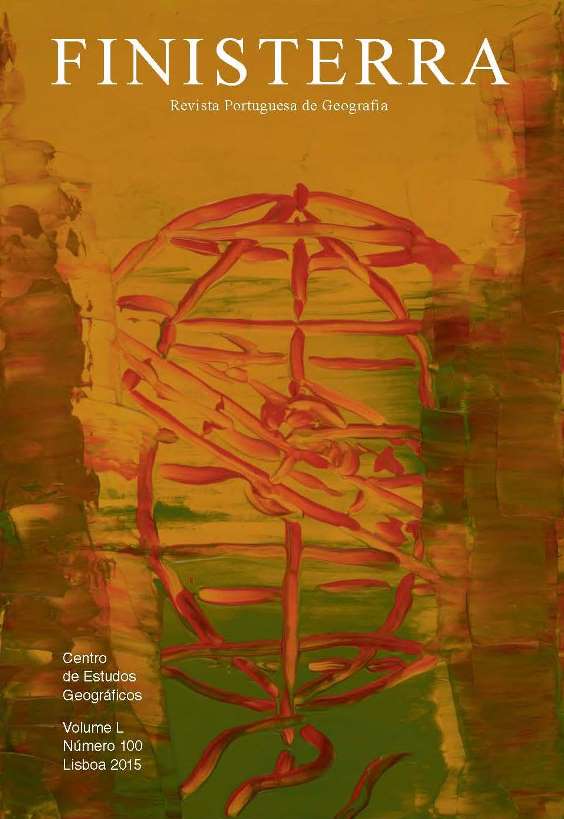Finisterra. Biografia de uma revista de geografia (1966-2015)
DOI:
https://doi.org/10.18055/Finis7858Keywords:
Finisterra, CEG, Geografia, revista, divulgação, PortugalAbstract
Com a publicação do número 100, celebram-se os 50 anos de Finisterra. Revista Portuguesa de Geografia (1966-2015). Neste texto biográfico, depois de um breve enquadramento, que situa o nascimento da revista, reconstitui-se o percurso das suas estruturas organizativas desde o primeiro número, analisam-se os tipos de textos publicados ao longo do tempo e faz-se uma análise minuciosa e ilustrada dos artigos durante os 50 anos de existência (autores, espaços e temas tratados, idiomas, ilustrações). As principais fases do percurso da revista replicam de algum modo aspectos evolutivos da Geografia. A fase de lançamento (1966-1975) da Finisterra, concebida desde início como uma publicação internacional, acompanhou o aumento do número de geógrafos, bem como o confronto de ideias e de correntes de pensamento contemporâneo. No período seguinte, de consolidação (1976-1994), iniciaram-se alterações nas estruturas organizativas e no aspecto gráfico, ao mesmo tempo que se divulgavam novos temas de investigação geográfica. No período de alterações estruturais (1995-1999) criaram-se outros órgãos consultivos externos, novas normas de publicação e diferentes formas de apresentação dos textos. Pode dizer-se que se lançaram as bases para a fase seguinte, estandardização de procedimentos, internacionalização e difusão em acesso aberto (2000-2015). Nestes anos mantiveram-se as preocupações com o controlo de qualidade dos textos e o aumento da difusão da revista, agora facilitada pela era digital. Em todas as fases, foi determinante o papel dos revisores científicos, cujo empenho silencioso, anónimo e gracioso nos apraz destacar nesta celebração dos 100 números da Finisterra. Parafraseando Ruben A. “o geógrafo não cansa, avança”: são estas as perspectivas para a nova fase, que se iniciará em 2016.
Downloads
Downloads
Published
How to Cite
Issue
Section
License
-
The opinions expressed in the texts submitted to Finisterra are the sole responsibility of the authors.
-
Authors retain copyright and grant the journal the right of first publication, with the work simultaneously licensed under the Creative Commons Attribution License, which allows others to share the work with acknowledgement of its authorship and initial publication in this journal.
-
Authors commit to following the “Submission Guidelines” available on the RCAAP platform.
-
Whenever the text requires changes based on suggestions from Scientific Reviewers and/or the Executive Editorial Board, authors agree to accept and implement these changes as requested. If there are changes the authors disagree with, appropriate justifications must be provided on a case-by-case basis.
-
Reproduction of copyrighted material has been previously authorised.
-
The texts are original, unpublished, and have not been submitted to other journals.
Copyright
It is the responsibility of the authors to obtain authorisation to publish any material subject to copyright.
Editing Rights
Editing rights belong to the Centre for Geographical Studies of the Institute of Geography and Spatial Planning, University of Lisbon.
The editing of a text submitted to Finisterra for publication implies that it is an original.
Publication implies acceptance of the submission guidelines and compliance with authors’ responsibilities.
Publication Rights
All publication rights belong to the Centre for Geographical Studies, as the publisher of Finisterra.
Licence URL: CC Attribution – Non-Commercial – No Derivatives (BY-NC-ND).
Digital Preservation Policy
Finisterra uses the Open Journal Systems (OJS 3.2.1.4), a free and open-source software for journal management and publication, developed and distributed by the Public Knowledge Project (PKP) under the GNU General Public License. PKP is a multi-university initiative that develops open-source software and conducts research to improve the quality and reach of scholarly publishing. OJS includes the PKP PN plugin, a means of digitally preserving journal content in the PKP Preservation Network (PKP PN), which ensures long-term access to OJS journal content. PKP enables OJS journal publishers to preserve content in a decentralised and distributed manner. This ensures that, in the event a journal ceases publication or goes offline, continued access to articles and issues remains available (long-term preservation).
For more information, visit: https://pkp.sfu.ca/ojs/



